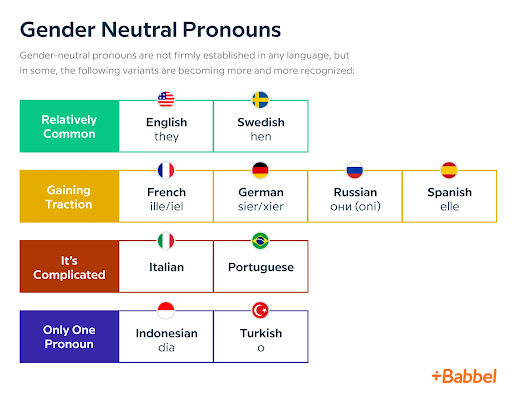10.18.2021: Lars writes on gender-neutral language in French and beyond
10.8.2021: Lars writes on gender-neutral language in French and beyond

The French language is extremely gendered. All French pronouns, adjectives, and nouns are gendered. Having such gendered language can be an issue when referring to someone that one may not know the gender of or in the case of transgender individuals that may want to use pronouns and agreements that are neither male nor female. A problem also lies in the domination of masculine agreements over feminine ones and sometimes a lack of feminine versions of words for certain words and career titles. As such, there has been a push by French feminists and LGBTQ+ activists to allow for more inclusive language. The French government however, is fighting against it.
In theory, the inclusion of gender neutral language is purely beneficial. By making and teaching inclusive language that doesn’t default to masculine, French feminists and LGBTQ+ activists believe that it will yield positive change. The thinking is that educating young people on gender inclusivity and neutrality will produce less sexist work environments and make misgendering more unlikely. The Académie française, a French language watchdog group, sees it differently, stating that gender neutral language “is an aberration that poses a mortal threat to the French language and which the nation will need to account for to future generations”. In May, a government circular was published that bans gender inclusive writing in schools and in February, sixty members of French Parliament drafted a bill to ban gender neutral language among government officials and civil servants. It’s been so controversial largely in part because it is seen as a political issue– as though the inclusion of women and transgender folks is some “indocrination”. Marginalized groups just want to be represented and respected and there is nothing to lose by changing the linguistic gendering of French.
Emmanuelle de Riberolles, a French professor of literature, argues that gender inclusive language should not be taught because “children should not be dragged into struggles that do not concern them” as though it is not something that children are also grappling with. Children are extremely vulnerable to thoughts that they may not be “supposed” to be in a certain area of study because of their gender. According to a study by the American Association of University Women, the groundwork is laid for STEM careers early, but young girls find themselves stepping away from the male-dominated field when they feel there is no space for women in it. One can imagine how this translates to French, where there are only maculine words for “engineer”, “governor”, and other positions. “Children should not be dragged into struggles that do not concern them” is also spoken as if children are not capable of understanding their gender to be neither man nor woman. For some transgender folks, myself included, they are aware of their trans-ness at an early age. By giving young students the ability to articulate their gender identity, not only does it allow for them to be themselves, but also aids their classmates in respecting them.
While gender neutral language is discouraged formally, it is not a deterrent for transgender people in need of an alternate to typically male and female pronouns and agreements. In French, new pronouns have been created: Iel, ille, ol, al, ul, and yul are all options of what are known as “neo-pronouns” or, pronouns that are not officially recognized by the language.
Unfortunately, even with gender neutral pronouns, French requires that nouns and adjectives agree, leading many people to have to choose between masculine and feminine agreements. The best fix for gendered agreements thus far has been “middots”– a floating full stop mid word (i.e. “Français·es”) that allows for both masculine and feminine agreements. It is not a perfect solution, but it is a step in the right direction toward inclusivity and the movement to further de-gender French is only continuing to grow.
Click the links below to learn more:
https://www.capstan.be/french-government-bans-inclusive-writing-in-schools-but-accepts-other-changes-that-feminize-language/
https://www.aauw.org/app/uploads/2020/03/why-so-few-research.pdf
https://www.theatlantic.com/international/archive/2017/11/inclusive-writing-france-feminism/545048/
https://elsafrenchteacher.com/professions-feminine-french/